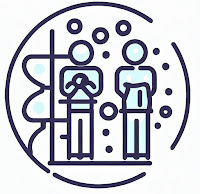GenAI in the Public and Nonprofit Sectors
Jacqueline Lambiase, Rosalynn Vasquez, and I asked nonprofit and public sector communicators about their planning, training and policies related to GenAI use. The TL;DR version is that 85% were using GenAI in their professional work, but very few had training, discussions, or ethical guidelines. There was a disconnect between what they thought was most important related to AI ethics and what they believed their bosses' main concerns were. We developed a 10-point model for the ethical adoption of new tech for public relations practitioners, as well as adapted an ethical sensitivity scale for public relations.
Maben, S. K., Lambiase, J., & Vasquez, R. A. (2026). Self-starters and lone rangers: Municipal government and nonprofit PR practitioners’ approaches to AI training, ethics, and policy-making. Public Relations Review, 52(1), Article 102664. https://doi.org/10.1016/j.pubrev.2025.102664Early Coverage of ChatGPT
Lora Helvie-Mason, Prairie Parnell, and I wanted to document how the advent of ChatGPT was covered in the higher education press, specifically The Chronicle of Higher Education. Using qualitative analysis, we reviewed the initial articles, letters, and briefs written by staff and guest writers for agenda-setting on the technological advancements in generative artificial intelligence (AI), specifically ChatGPT. Primary themes identified in the articles included AI as a tool, AI’s interplay with education, faculty agency and implications, and surveilling students and examining academic integrity. The tone was categorized as informational, instructive, and cautionary.
Maben, S. K., Helvie-Mason, L. B., & Endres-Parnell, P. (2025). The Chronicle of Higher Education’s initial coverage of the advent of ChatGPT: Navigating generative artificial intelligence. Southwestern Mass Communication Journal, 41(2). https://doi.org/10.58997/vsk7tp50
Emojis in Organizational Social Media Messaging
In a quasi-experimental study with Chris Gearhart, we found that messages with emojis were considered more competent, attention-getting, and engaging than messages without. Emoji sequences also tested well. 🐸💜💥Context matters, and serious messages should proceed with ⚠️ caution. We didn't find much difference between perceptions based on age, gender, education, etc.
Gearhart, C. C., & Maben, S. K. (2026). Stakeholder Perceptions of Emoji Appropriateness in Organizational Social Media Messages. International Journal of Strategic Communication, 1–23. https://doi.org/10.1080/1553118X.2025.2596006






